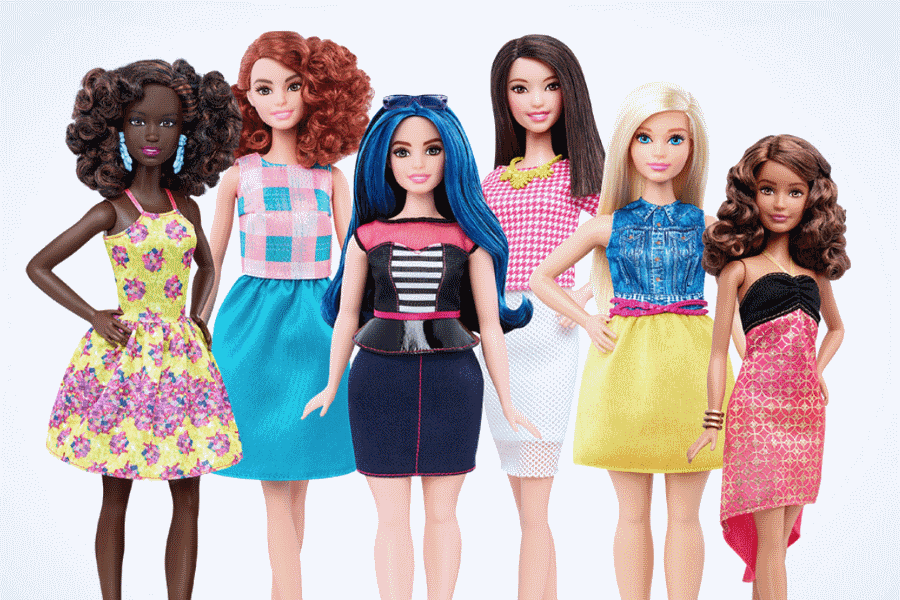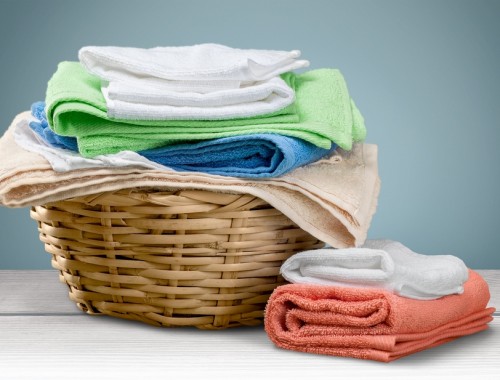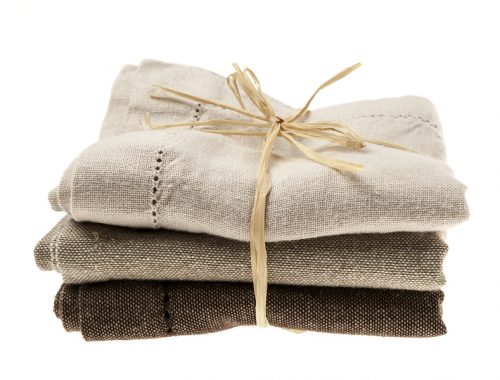We’re thrilled today to be speaking with Erica Ehm from the YummyMummyClub about an exciting new and relatively historic event that has taken place which she has had a hand in developing. Mattel has been making the Barbie Doll, essentially unchanged, for years. Even through the era of men’s magazine and feminism, not much changed for that classic American icon, Barbie. But today, there’s been an announcement.
Podcast transcript:
Jennifer: We’re thrilled today to be speaking with Erica Ehm from the YummyMummyClub about an exciting new and relatively historic event that has taken place which she has had a hand in developing. Mattel has been making the Barbie Doll, essentially unchanged, for years. Even through the era of men’s magazine and feminism, not much changed for that classic American icon, Barbie. But today, there’s been an announcement.
Mattel is launching a new Barbie that fulfills the dreams of so many…..that Barbie could look a bit more like them. Erica’s here because she was one of the panel of expert moms who was brought in to talk about whether Barbie could change and if she was going to change, how she needed to change and what that change was going to look like. We are thrilled and honored to have her here with us to talk about the new Barbie. Welcome. Erica.
Erica: Thanks so much. It’s a really exciting time, I think, for little girls.
Jennifer: When I was a kid, I don’t know about you, did you play with Barbies?
Erica: Not really, I was more of a tomboy.
Jennifer: Do you recall thinking that the Barbie that existed when we were young really wasn’t accessible to everybody because nobody really looked like that?
Erica: I think the issue is that we, as girls, and now as women have evolved so much that we are so much more than … even the girls from 30 years ago, the little girls that Barbie represented then are not alive anymore. We’ve evolved into different types of being and we have different expectations. They’re much more focus on body awareness and how we are affected by things like dolls and pop culture and et cetera. I don’t know if it was actually detrimental back then but I know that once you become more self aware, things starts to make more sense.
As our generation has grown up, we’re starting to question the images that we grew up with and rebel against them. I think this is a result of our generation of parents saying to Barbie or to Matter, “We don’t want our children growing up with this unreasonable definition of beauty because beauty comes in many different forms.” I think what’s really exciting is that the people at Barbie listened.
Jennifer: You wrote about your experience at Mattel for Yummy Mummy. One of the phrases that you used in the piece that you hosted about the experience of being involved in the process was that you got to go behind the pink veil. Take our audience behind the pink veil with and talk about what was really profound and moving to you and surprising to you.
Erica: What was very interesting to me was, first of all, that they even wanted me to participate because I was not an avid Barbie fan. When I realized the people that they had chosen, I understood that none of the people who were invited to be on the panel were in fact the type of women or moms or men because there were a variety of people on the panel who actually were fans of Barbie. They, in fact, had a lot of problems with Barbie. It became quite clear very quickly that the people who put together this advisory panel of women and one man was looking for really feminist, small, pull no punch feedback on the evolution of Barbie.
Number one, we were all invited to sit around this large table and to share our thoughts of Barbie. I would tell you that most people were a little bit uncomfortable because most of them had less than positive things to say about the brand. Everybody was a little bit nervous. Then the team of Barbie, the executive team, including the president shared their thoughts. They were all in line with what we were saying. They said, “You’re right. Times have changed. Barbie has outgrown her current state. It is time to make changes. The reason why you are all in this room is because we’re going to do something revolutionary and we want you to help us.” I think that was the most surprising thing for all of us around the room, was, “You are? You agree?”
Then the second big shock was when we were invited back six months later and they unveiled this new suite of Barbie Dolls. They were exactly what they promised which were dolls that were diverse, tall, curvy, petite, different skin tones, different hairstyles, different shapes, that represented many different versions of what beautiful is. We were so excited and pinching ourselves that were were seeing sort of an evolution in pop culture history.
Jennifer: Erica, you are a public figure. You’ve been a pioneering broadcaster for many years. You helped to define music television. You’re a musician, an actress, you live in a very public way. I could make the argument that you have had a role in changing how girls see themselves, you have given girls a new way to imagine their possibilities in the future. You were visible. You weren’t just somebody’s mom on TV. You were part of the change. In doing so, you helped to shift the public visibility of women along with generation of women in the public eye.
Erica: Can I quote you on that?
Jennifer: Yes, please. One of the things that I find extraordinary is that all happened and yet through it all Barbie didn’t change. Barbie didn’t change 10 years ago. Barbie didn’t change 20 years ago. One can make a really good argument that there was a chance or a need for Barbie to change a while ago. Did Mattel ever tell you team members why it stuck to its stance and not change Barbie before this? Did you ask Mattel why did it take so long?
Erica: Well, they told us. It was very clear. It’s dollars and cents. The cost of building these molds of different Barbies is huge. To redesign an iconic toy like that is huge. It’s a huge risk. Now, they actually have these new different Barbie shapes which means that the clothes don’t fit now, you understand, right? Part of the beauty of Barbie, being the same size as I’ve learned all these years is that there’s a repertoire, a whole cupboard of outfits that you can pull from 1959 until today that will fit Barbie, all her shoes and her accessories and her clothing, everything fits Barbie.
What they’ve done is they have really shaken up their bottom line by doing this. They are going to confuse consumers, absolutely. There’s going to be problems now because when you buy an outfit for curvy Barbie, it’s not going to fit the regular Barbie. I think that’s really the big problem is it’s just the dollars and cents, the bottom line of it. But I think that they have been losing so much money and the brand was quickly becoming irrelevant for new families. They basically had no choice.
Jennifer: In reading your piece, an idea that struck me. You write as a mom, and you ask how do we bring toys into our own family? Are we bringing toys in that give our children something that we hope inspires them for play? Historically, Did you bring Barbie into your home? Did you bring things into your home that you hoped kids would play with, your kids would play with and did they end up playing with them or did they resort back to some of those classic cap gun and Barbie type things?
Erica: My son love swords. We would never have guns but he loves playing with swords. My daughter was very attracted to the whole princes world. She loved all the gowns and the Disney thing. We just followed suit. But we also told her that she was brave and strong all the time. But I think it’s also how you message the toys. When we watch shows on television and there were commercials for dolls. She’d say, “I want that doll.” We would say, “We should go look at it in the store because you will be surprised how different and crappy it looks in person.” We’ve sort of educated our kids and let them make their own decisions. My daughter was never a big Barbie fan. However, because I’m in the world of the mom space, we’ve had a lot of time working with Barbie. We did a bunch of Barbie parties, Barbie videos and so my daughter has met Barbie and that kind of thing. She’s a little [inaudible 11:44]. She’s been there. She gets it.
Jennifer: In the old days, if Barbie looked a little different , Mattel gave the doll another name like Midge, if her skin was a little bit darker, et cetera, how are the new Barbie figures with the curvy shapes and the tall and petite shapes, are they going to be known as Barbie or do they give them all different names like they did in the old days?
Erica: I don’t actually know. I think might be like Curvy Barbie. I think they’re keeping the same name. I think they are. I think they’re all called Barbie.
Jennifer: Tell me a little bit about YummyMummyClub and the inspiration for it.
Erica: It’s an online magazine that I started almost 10 years ago really. The idea is that when I started online, there wasn’t a lot of place for women who wanted to talk about the ups and downs and the stresses of motherhood as well as other topics that were not necessarily related to parenting but certainly relevant to a mother’s life who happens to have kids. I started the online magazine and found a bunch of other contributors who were like-minded. We built a real community. I think it’s very feminist, but it’s feminist sort of under the covers if you will. We don’t sort of boldly talk about feminism in every article but every piece of content somehow empowers women.
Jennifer: It’s there intrinsically.
Erica: Yes.
Jennifer: How did parenting and becoming a parent change you as a broadcaster?
Erica: It stopped me from being a broadcaster. Because I changed my lifestyle to accommodate my family. I run this business now from my home. I’m home for my kids although for example they’re here and they’re sort of tiptoeing around as we’re talking, I basically ignore them all the time. But I am home. My interest in getting out of my pajamas and putting makeup on and going on TV sort of became less important to me. I like the idea of hiding behind the computer for much of it and using my brain and not my face.
Jennifer: I’m really interested in your story. I am a big fan of your work on the magazine. I think it gives a really resonant, lovely, rich voice to your experience. Talk about being a public voice now if not so much of a public person in the eyes of the young girls who you influenced before. Are you finding that the people that might have grown up watching you are now young moms reading you? Have you gotten any response about that?
Erica: Oh yeah, absolutely. I think that’s what initially gave YMC its first legs because a lot of people who grew up with me were also having kids. We all reconnected at a different stage in our life. For me though, when I work that much, I took a lot of pride that I was a role model. I was always a goody two shoes. I like music. I like interviewing bands but I was far from cool. I never pretended to be cool. I wanted to be smart and nice. Fast forward to starting the online magazine, that same persona stays with me and that desperate desire to empower women and girls stays with me.
My daughter is a victim of it now because for example I was showing her a video that I had shot a few years ago with many of the top names in moms space, I haven’t seen it in about four years and I pulled it out, it was about how to deal with mean girls. My daughter at the time was probably seven and now she’s 12. I said, “Watch this video. Tell me what you think.” She said, “Yeah, that was good.” I already noticed. She tell me this all the time. The people who are around me hear me talk about this stuff all the time. It’s kind of what I’m obsessed with.
Jennifer: Tell me what you think the year ahead is going to hold for the “Mom” space. There are so many challenging, frightening things in the world. How are you looking ahead considering it’s still the beginning of the year at what’s coming? As you look into your crystal ball, how can you help get moms prepared for all these coming challenges?
Erica: That’s a huge question. I think that for us, what we’re trying to do is continually find interesting story experts who also just tell it like it is without scaring people. For example, in BC, we have our staff doctor who’s also a mom of two, she’s a family doctor, Dr. Kim Foster, she writes these really thoughtful pieces on potential health issues that families should aware of, mothers for their own health and also the health of their kids. Similarly, we have really amazing storytellers who can capture these little moments in their lives and turn it into not just a great story but a learning opportunity or a point of discussion.
Jennifer: What is your “message” for your readers?
Erica: I think to me, that is really what our focus is, is just to really enhance the storytelling and make it rich. I mean, as we evolve as an online publication, I think the value has to rise, the quality has to rise, the respect has to rise. I think more responsibility is put on us as we become more and more of a place where a lot of moms get their safe information from so there’s responsibility there as well. But these are all really awesome challenges for us because we don’t want to stop evolving. But I think that there is something evergreen about being a mom. As some of our writers age, they can share these stories with the new moms who are coming up and tell them that, “Really, you’re not alone.”
Jennifer: It’s going to be okay.
Erica: Probably.
Jennifer: How hopeful is it to you that the thing that you thought could not change has changed?
Erica: You know what, what’s interesting to me about this, if there’s one thing that I learned, not by being behind the pink veil but being on the other side of it, is that parents can vote with their dollars. It is precisely because the fact that moms and dads decided that Barbie was not going to be in our homes because they didn’t like the message that it was sending, corporate America had to listen. That’s a really important message for everyday people to hear is that that constant pressure have a huge effect on the future of a major company.
Jennifer: It wasn’t just enough to come up with another fancier, more elaborate, collectible version of Barbie. This is more of a dial it back and get more real strategy… This was the real solution.
Erica: Well, that’s what parents were asking for. It’s loud and clear. The entire executive team was 100% aware of what everybody was saying on the street about them. They all knew but they never had the okay from the president to go and change this iconic figure. But I think once the bottom line was really affected, that’s when they said it’s do or die. They finally got to do what they had wanted to do because what I didn’t also know about the executive team at Barbie, the majority of them have been working there for decades and they are passionate about Barbie and they all started very young and they all have families now. Many of whom have grown daughters or teen daughters. For them, I’m sure they were very conflicted as they were growing up raising their daughters.
Now, they get to finally do what they wish they could have done for a long time. This is very exciting for the team. This was personal for the team. They were on fire. They were so excited that they were able to affect history and the future of Mattel and Barbie. I know that for a fact because I met them.
Jennifer: Do you suspect that this will be a success for Barbie and Mattel? Do you think that the public will respond and say, “Yes, finally, I’m going to vote for Barbie again with my dollars?”
Erica: I think that based on my Facebook feed and my Twitter, everybody is giving it a thumbs up. Having said that, the people who are on my Facebook and Twitter feed are probably older than the new moms that are going to be buying the dolls if you will, because most of my friends have kids like 10 and older.
Jennifer: What age does Mattel say that most kids want to play with Barbie?
Erica: They’re younger. They like from four, age four on, like four to 10, maybe 12 is when they’re getting out of it. It’s a younger demographic which means it’s millennial moms. Millennial moms are the ones who are going to have to buy into this. I think that there is definitely potential for it but who knows if they’re going to … it maybe too little too late. I actually don’t know.
Jennifer: I think this new idea for Barbie is great. But. I have to tell you, I never perceived this as a risk until just now as you’re saying this. There is a real risk that millennial moms will reject this.
Erica: They won’t reject it for what it’s become. They just may not be interested anymore. That’s all I’m saying. It may not renew their interest.
Jennifer: They may not adapt it.
Erica: But here’s the thing …
Jennifer: Will they buy in?
Erica: The new Barbies, the Fashionistas, they’re a hit. They’re really fashionable and stylish, 22 eye colors, 24 hairstyles, seven skin tones. The millennial generation is very aware of style and fashion especially new moms. That’s good for Barbie because Barbie is a fashion icon. It’s hugely popular by the way with the whole … there’s like a huge business that does not include little girls. It’s adults who collects Barbies for its incredible detail in the world of fashion. There’s collectible Barbies from all the top designers, hairstyle, everything is meticulous. All the accessories, there’s a whole business there. Because of that, it is very possible that the millennials will embrace this new thing because it’s so high fashion.
Jennifer: This is so interesting. I’ll have you know, you put a spin on this which has really has open my eyes and gotten me to rethink this in a way that I wasn’t prepared for but there we go. Thank you very much.
Erica: But it’s because I was there. It’s hard … I wasn’t allowed to talk about it. I was not allowed to breathe single word except I was allowed to say that I was on the Barbie global advisory council. That’s all I was allowed to say. I wasn’t allowed to take any photograph. They took us in the backroom. They took us, they showed us how the dolls are made, how the hair is grafted onto the head. They introduced us all the designers. They showed us how they made the dresses. They showed us everything and they begged us, “Please do not tell our secrets.” They said, “We trust you. We’re inviting you in to a top secret place.” They were so welcoming and open.
Because of that, they allowed us to absorb their culture. They were very clear. They were very open about the challenges ahead and also what their hopes were. I do believe that this reinvention is absolutely well-intentioned by the core team and it’s absolutely based on dollars for the head executives. It’s only a win-win situation for everyone if this Barbie does reignite the brand for families.
Jennifer: Thank you for being so generous with your time. You’ve been exceedingly gracious in sharing all this with us. Please come back and visit with me again. I look forward to that.
Erica: You’re a good interviewer. I would.
Jennifer: Erica, thank you so very much. Cheers.
Erica: You’re welcome. Thank you so much.




